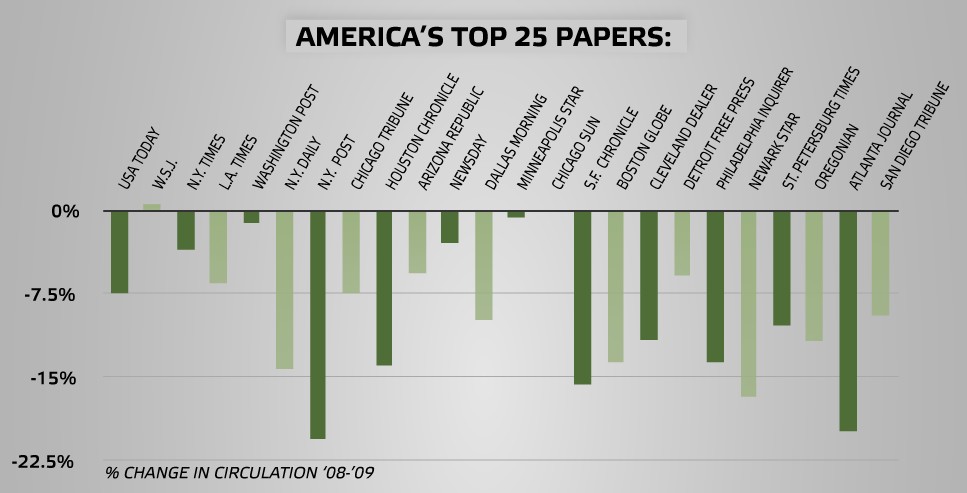 Lawmakers are holding hearings on Capitol Hill to try to figure out solutions to the newspaper industry’s troubles. U.S. Rep. Carolyn Maloney (D-N.Y., at right), who chairs Congress’s Joint Economic Committee, has proposed a bill that would allow community and metropolitan papers to become nonprofit organizations. Similar legislation has also been introduced in the Senate.
Lawmakers are holding hearings on Capitol Hill to try to figure out solutions to the newspaper industry’s troubles. U.S. Rep. Carolyn Maloney (D-N.Y., at right), who chairs Congress’s Joint Economic Committee, has proposed a bill that would allow community and metropolitan papers to become nonprofit organizations. Similar legislation has also been introduced in the Senate.
 At hearing last week, Newspaper Association of America President John Sturm said handouts aren’t the solution but that the government should allow publishers to charge current losses against past profits in order to claim retroactive tax refunds. “Newspapers need cash now to preserve jobs next year,” he said. “It’s really that simple.” Sturm also dismissed an outright government bailout as inappropriate, given newspapers’ governmental watchdog role.
At hearing last week, Newspaper Association of America President John Sturm said handouts aren’t the solution but that the government should allow publishers to charge current losses against past profits in order to claim retroactive tax refunds. “Newspapers need cash now to preserve jobs next year,” he said. “It’s really that simple.” Sturm also dismissed an outright government bailout as inappropriate, given newspapers’ governmental watchdog role.
In a statement to the committee (PDF), Princeton University professor Paul Starr noted that government support of the media is nothing new. Starr pointed to pre-First Amendment legislation adopted in 1792 that gave newspaper publishers “cheap, below-cost rates for sending copies to subscribers and a franking privilege that allowed newspaper editors to exchange copies with one another through the mails at no postal charge.” To this day, federal and state governments mostly exempt newspapers from sales taxes, he added.
While scrupulously avoiding the term “newspaper” in his recommendations (subsidies “should be platform-neutral—they should not favor print media over online media, for example”) Starr argued for government subsidies and regulatory relief that would make it easy for media organizations to become nonprofits if they so chose. He also made the case for extending tax benefits uniformly to media companies without regard to their business model or political bias. This model is apparently working well in Scandinavia, the population of which is about 8% that of the US.
Seed Money
Or we could just leave the job to private philanthropists. Alan Mutter tells of a new Bay Area nonprofit that was just funded to the tune of $5 million by a local investor. The startup capital from Warren Hellman is considered “seed money” for a venture that’s being launched in collaboration with public broadcaster KQED and the Graduate School of Journalism at the University of California at Berkeley. Mutter suggests that if the venture could raise money at the same rate as an earlier experiment in Texas, the Bay Area initiative could surpass the size of Pro Publica, which has an annual budget of $9 million and which employs 32 full-time journalists.
Hellman’s decision was motivated in part by McKinsey research that found that newspaper employment and coverage of local news have both fallen by half in the Bay Area over the last five years. The as-yet-unnamed new venture will be different from others in its focus on local news. A base staff of professional journalists will provide the meat and potatoes coverage. Berkeley students will contribute information from a series of hyperlocal blogs they have set up and broadcast partner KQED will contribute its own content as well as rebroadcast the work done by the nonprofit. Hellman said he originally considered buying the distressed San Francisco Chronicle but passed because “the business model may not be there to put a sustainable, for-profit economic foundation under quality, professional journalism.” Comments on Mutter’s blog indicate some skepticism about the venture’s chances of success
Sunset for Sun-Times?
Two weeks ago, Sun-Times Media Group CEO Jeremy Halbriech sent a memo to members of the paper’s unions warning them that if they failed to ratify a proposal for a 15% cut in compensation, the company’s prospective buyer would pull out of the deal and the Sun-Times and its affiliates would close immediately. “No other bidder has emerged who will purchase our assets. If the current Buyer withdraws its bid, we will shortly run out of cash and we will be forced to shut down all of our publications and Web sites and liquidate the business. This will result in the loss of all 1,800-plus jobs across the Company,” he wrote.
Well, the union said no. Unlike unions at the Boston Globe and San Francisco Chronicle, which caved in to threats from the parent company, the city of big shoulders likes a good fight. Tomorrow is the deadline imposed by suitor James Tyree for the union to agree to terms. However, Tyree has made it clear that this is a take-it-or-leave-it offer. “I do not want to get into a negotiation,” he said. The unions want to negotiate. The staring match has gone on for two weeks. Presumably, no one is watching more closely than staffers at the rival Chicago Tribune, which would enjoy a business boost from the failure of its competitor.
Miscellany
Judy Sims has a few hundred words of practical advice for creating a profitable hyper-local publishing model. It starts with putting four people – an online product person, an online advertising sales person, an editor and a web developer – in an office that’s completely separate from the print operation. Then get them focused on giving readers stuff that’s hard to find out – such as which emergency room has the shortest waiting time – and crafting packages for advertisers that include a lot more than just display advertising. If you’re thinking of starting a localized news operation, use Sims’ outline as a basis for your business plan.
The executive board of The Boston Globe‘s largest union has canceled president Daniel Totten’s union credit card, suspended his check-signing privileges and ordered a ”comprehensive external audit” of union finances after learning of apparent violations of its financial rules. Totten presided over disastrous negotiations between his union and management at Globe owner New York Times Co. in which the union first rejected a series of concessions in a proposed contract and then settled for an even worse deal after the Times Co. threatened to shutter the paper.
From a graphic on Mint.com. You can find the whole image here.
Two Century-Old Weeklies to Close
The Calhoun City (Miss.) Monitor-Herald will shut down Dec. 31 after 110 years of publication. Its circulation of 811 was no longer enough to sustain it in a battle against the much larger Calhoun County Journal (circ. 4,700).
The Lemoore (Calif.) Advocate published its final issue last week afer 121 years. The staff tapped community contributions to tell the story of Lemoore and of its own rich history as the longest continuously operating business in town. The brief history of the Advocate online has these words about the role of local newspapers:
Small town newspapers seldom cover such mega events as tidal waves, auto industry bailouts or global warming. Small town newspaper staffers are too busy telling readers about lawn watering schedules, a sale at Mom’s Pie Shop and weather hot enough to melt the ice in your lemonade…Small town newspapers write stories that mean everything to their readers. And readers clip those stories to paste into scrapbooks filled with touchdowns and weddings, obituaries and births, yesterdays and tomorrows. There are no scrapbook stories about teamster strikes, golden parachutes or the polar bears’ plight.
Obits
Longtime New York Times columnist William Safire died at 79 of pancreatic cancer. The Pulitzer Prize-winning expert on speech and language was a bulwark of elite conservatism, a speechwriter for Richard Nixon and the author of Vice President Spiro Agnew’s famous phrase, ”nattering nabobs of negativism.” He won the Pulitzer Prize for commentary in 1978 for a series of columns about Carter White House budget director Bert Lance’s financial affairs.
The daughter of slain newspaper heiress Anne Scripps Douglas apparently leapt to her death from the Tappan Zee bridge. Anne Morell Petrillo jumped from the same bridge her stepfather chose to commit suicide after killing her mother with a claw hammer 15 years ago. Police have yet to make a positive identification. The Douglases founded the Detroit News.
Comments
This entry was posted on Monday, September 28th, 2009 at 12:23 pm and is filed under Facebook, Fake News, Hyper-local, Solutions. You can follow any responses to this entry through the RSS 2.0 feed. Both comments and pings are currently closed.




First thing to figure out is that the newspaper’s customers, the advertisers who have established net presence to do a whole lots more that just yell at the readership, are gone and really don’t need newspapers.
All media up to now have been only 1:N. (“Renting megaphones to Global Village Idiots”©™®, 🙂 The internet enables N:M communication to accept input from the audience (like any blog does, or the Amazon.com store does.)
Now how do journalists make any money, they have to eat after all, when the money has gone away?
You go the same way that the newspaper’s customers have gone. You go to the web.
The revenue may be 10% of what it was, and climbing, but the expense is vastly less since there is no more paper to layout, print and distribute.
Also, like the newspaper no longer has a morgue since all material can be kept online and available to queries, there is no more need to keep back issues. There are no more back issues. The newspaper expands to the size of its content.
Just like there are no more limits on the distribution of content, there are no more limits on the distribution of ads.
But who is going to pay for this wealth of material and how?
I will tell you.
• Newspapers need revenue. These people are the source of news itself, edited by professionals, written by professionals, researched by professionals.
• The Post Office need revenue. (Newspapers are the only ones hurt by the shift to the internet.)
• The people need reliable source of information, not just bloggers bloviating, pontificating and commenting on the news but the news itself, edited by professionals, written by professionals, researched by professionals.
Now where does the post office come into this again?
By keeping tabs on the distribution of a newspaper’s media files through RSS repositories (like iTunes does but for money,) and making the RSS repository accessible for paid subscribers.
Given the fact that all newspapers are now aware of the need for a pay wall for all stories less than a week old, (after which Google can index them,) they might be inclined to use the services of a newly relevant post office.
The post offices has franking privileges, can operate as a non-lending bank, has all of the required international agreements and already has the required iT infrastructure, this is a role that they would be well suited to.
[…] In our anxiety over building online business models, monetizing user traffic, rescuing newspapers, and otherwise maintaining (monetary) control on the web, the thing we’ve forgotten is that […]
[…] via Congress Debates Newspaper Rescue; Philanthropists Bankroll New Ventures | Newspaper Death Watch. […]
This is the welcome page for the dietguidance.us Association web site.